Diary of Trooper Ion Llewellyn Idriess-1917-1918 - Part 2
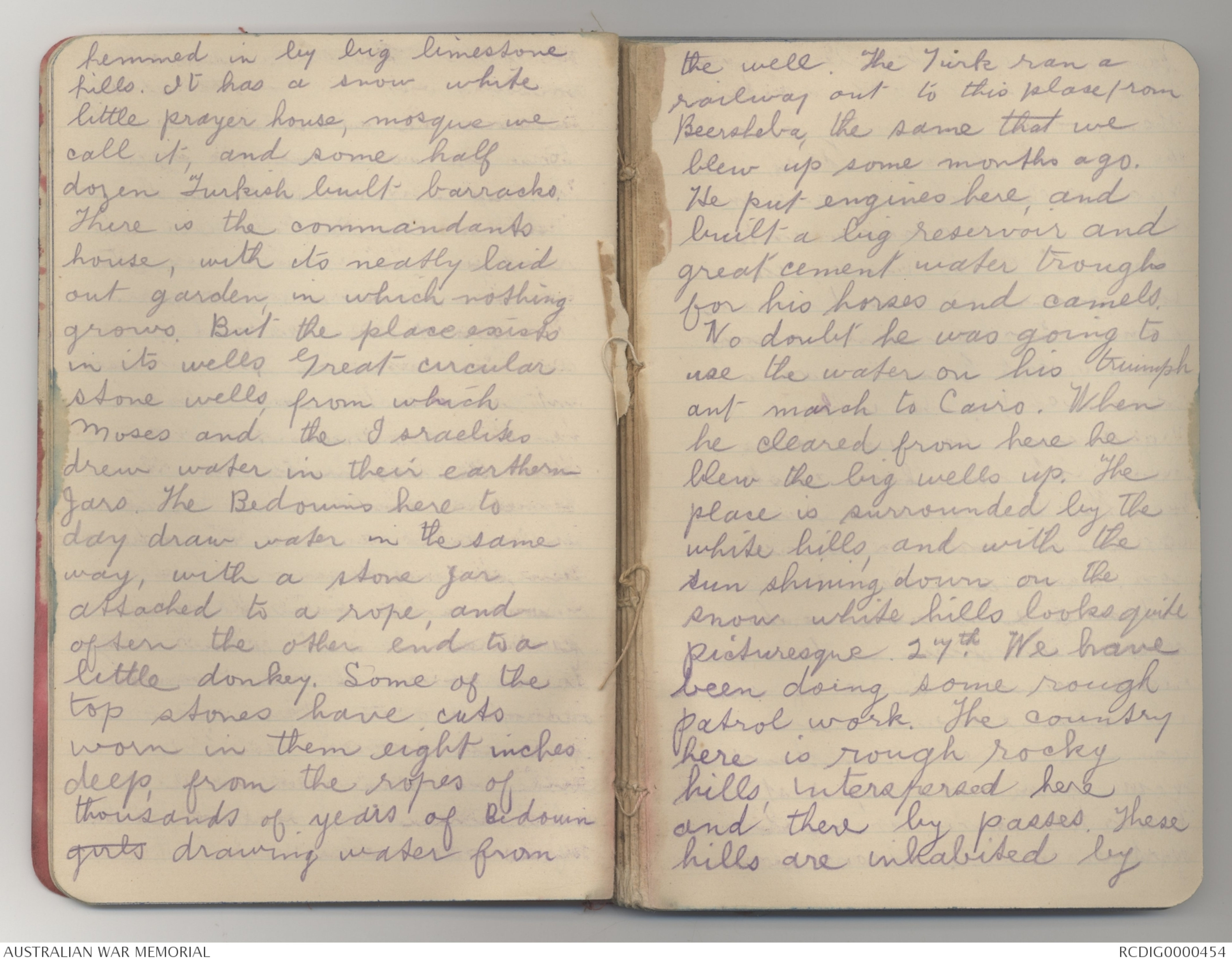
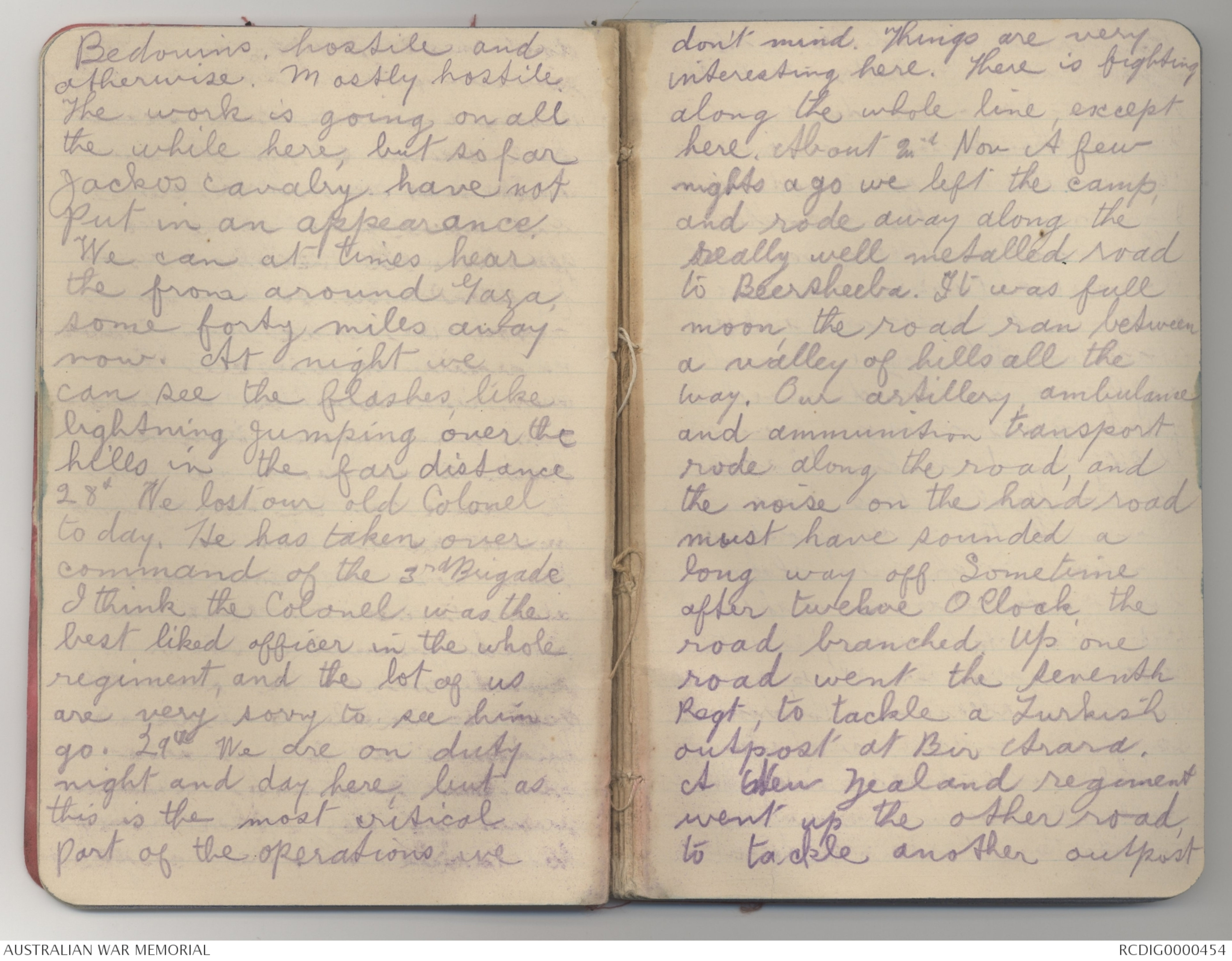
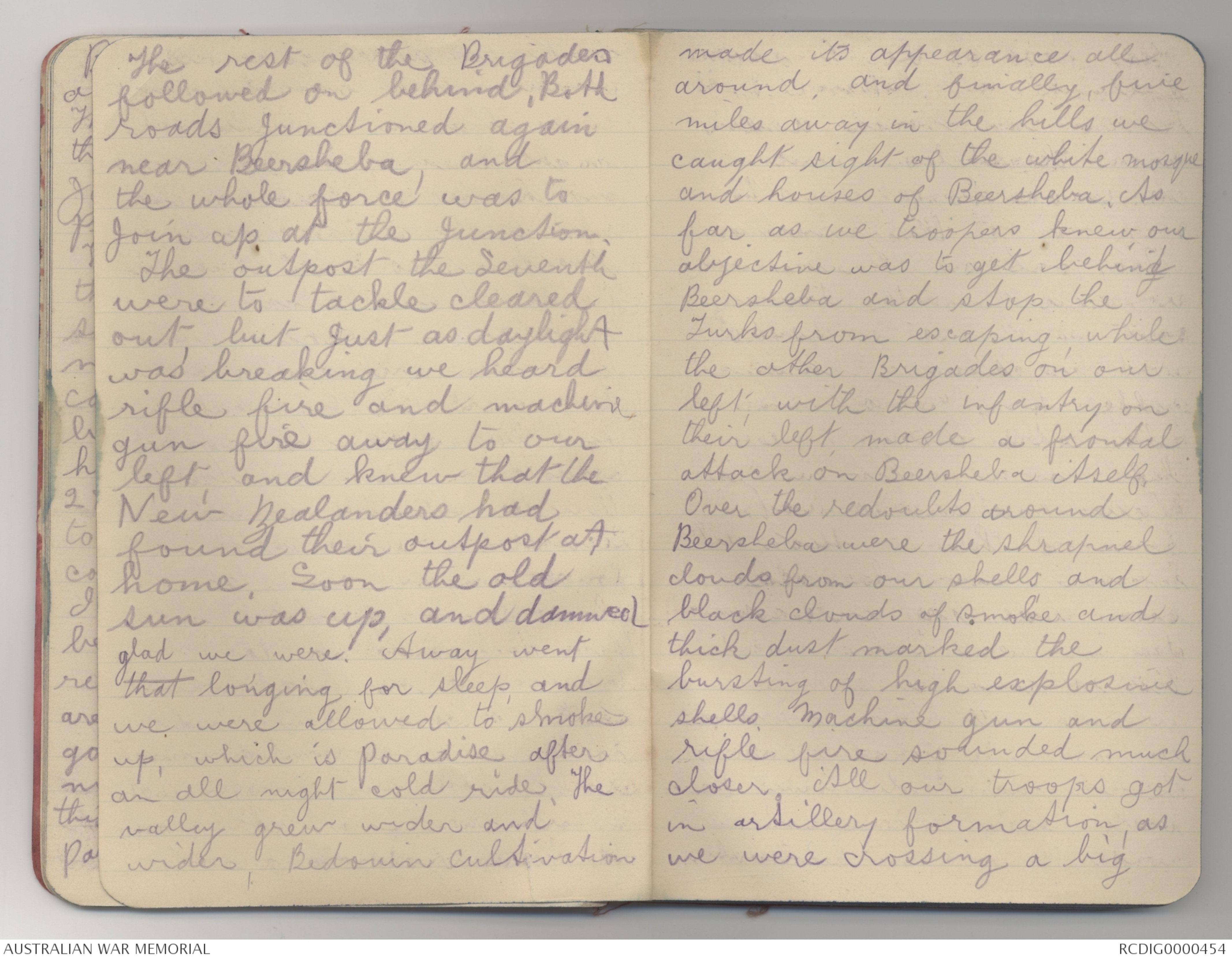
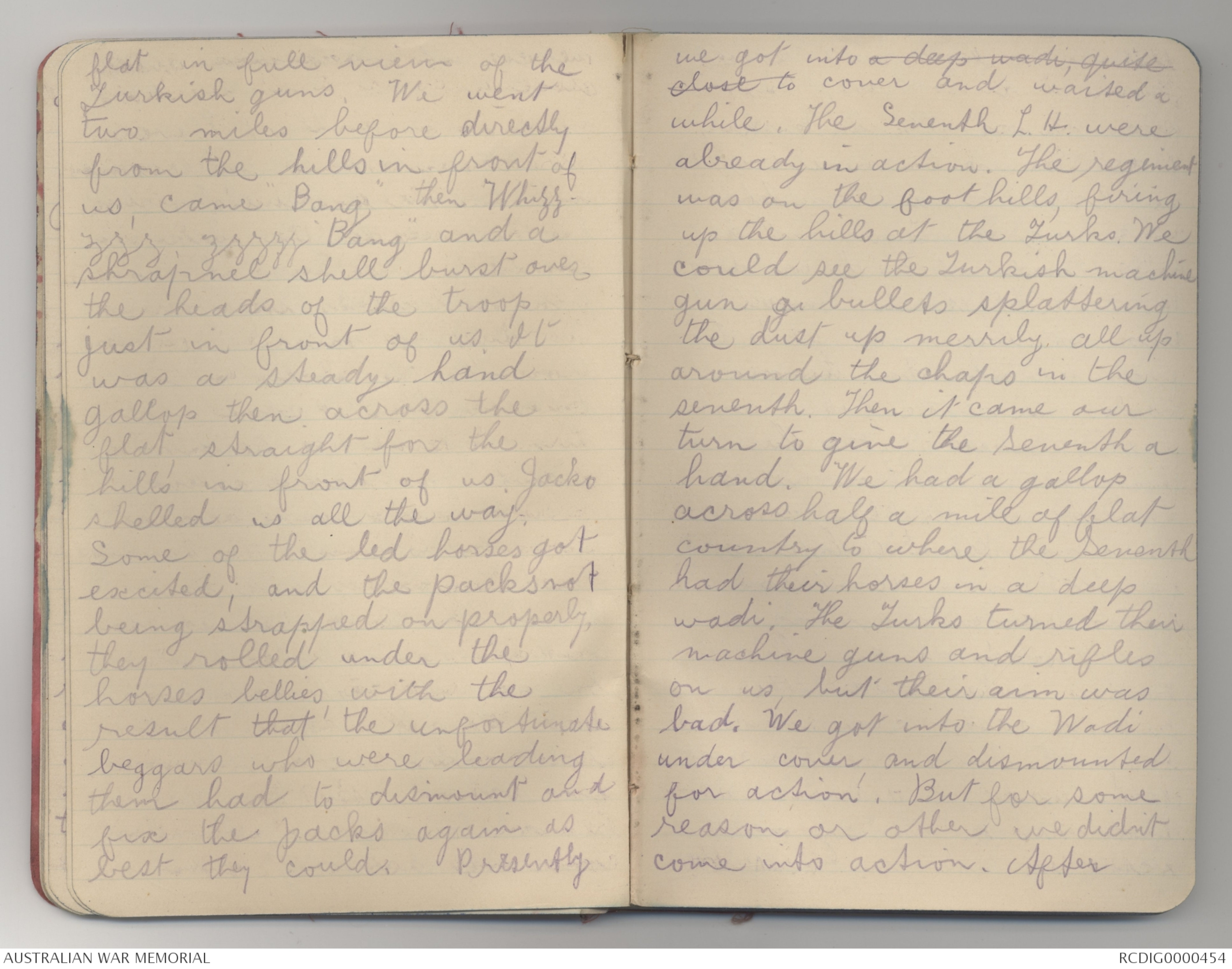
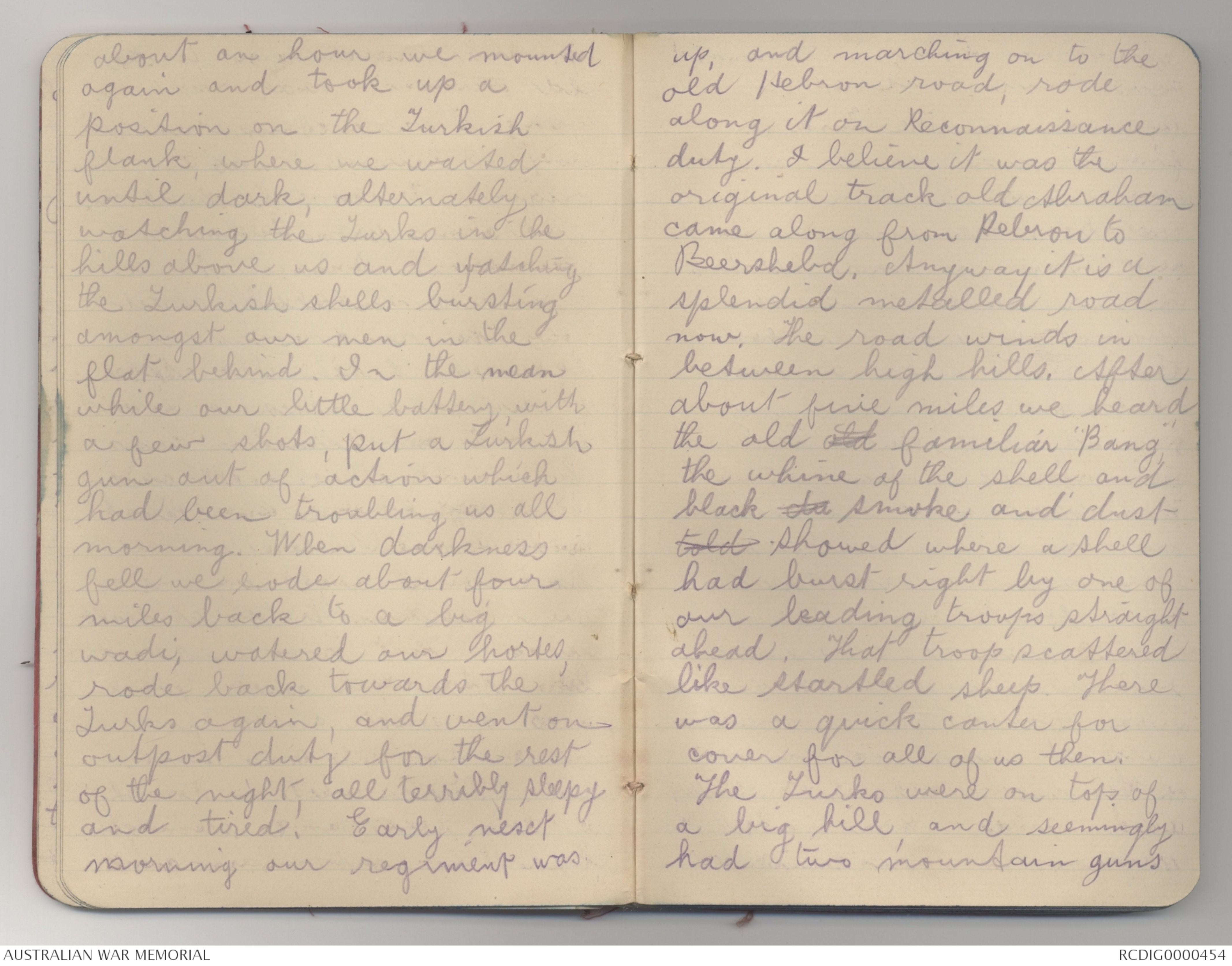
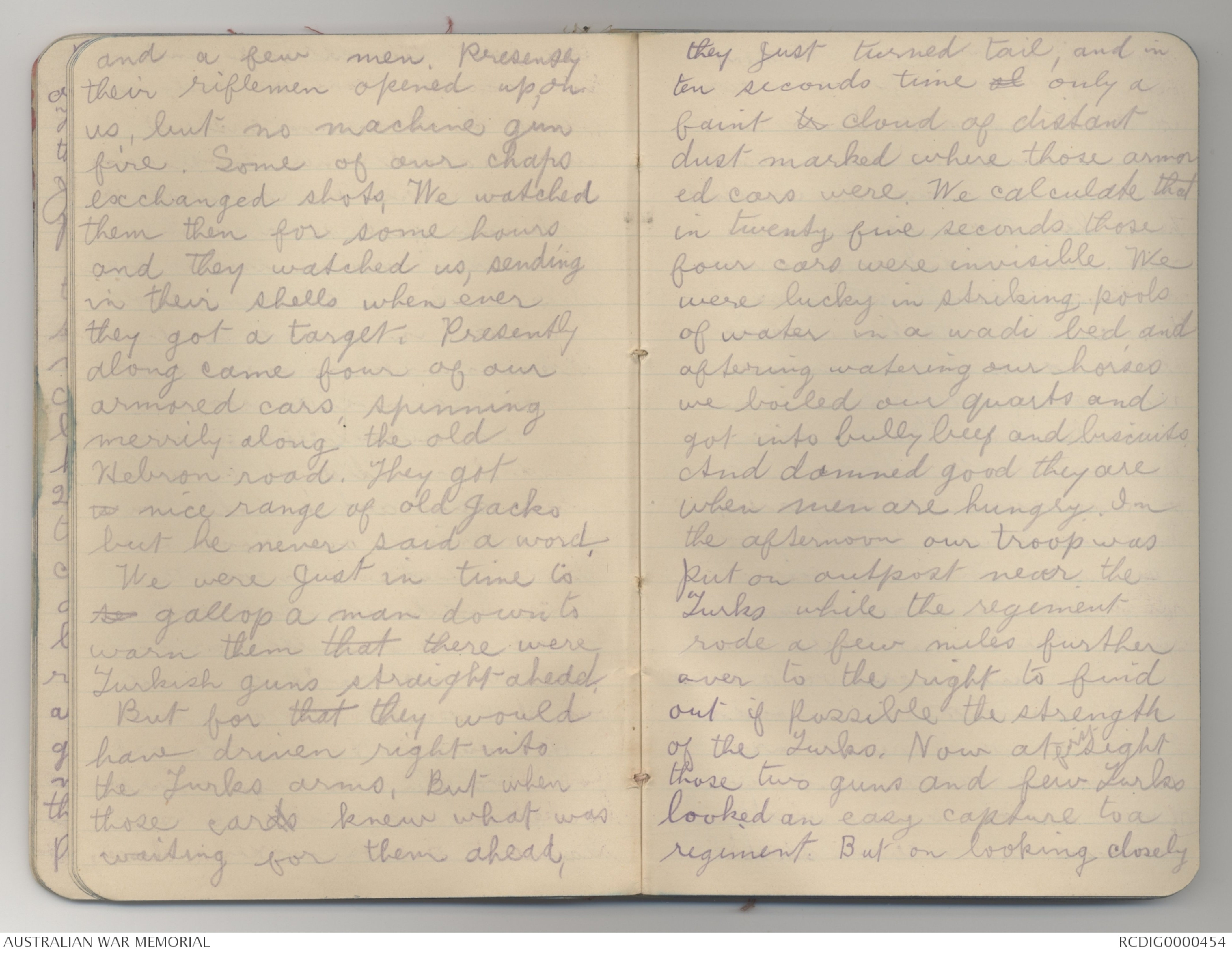
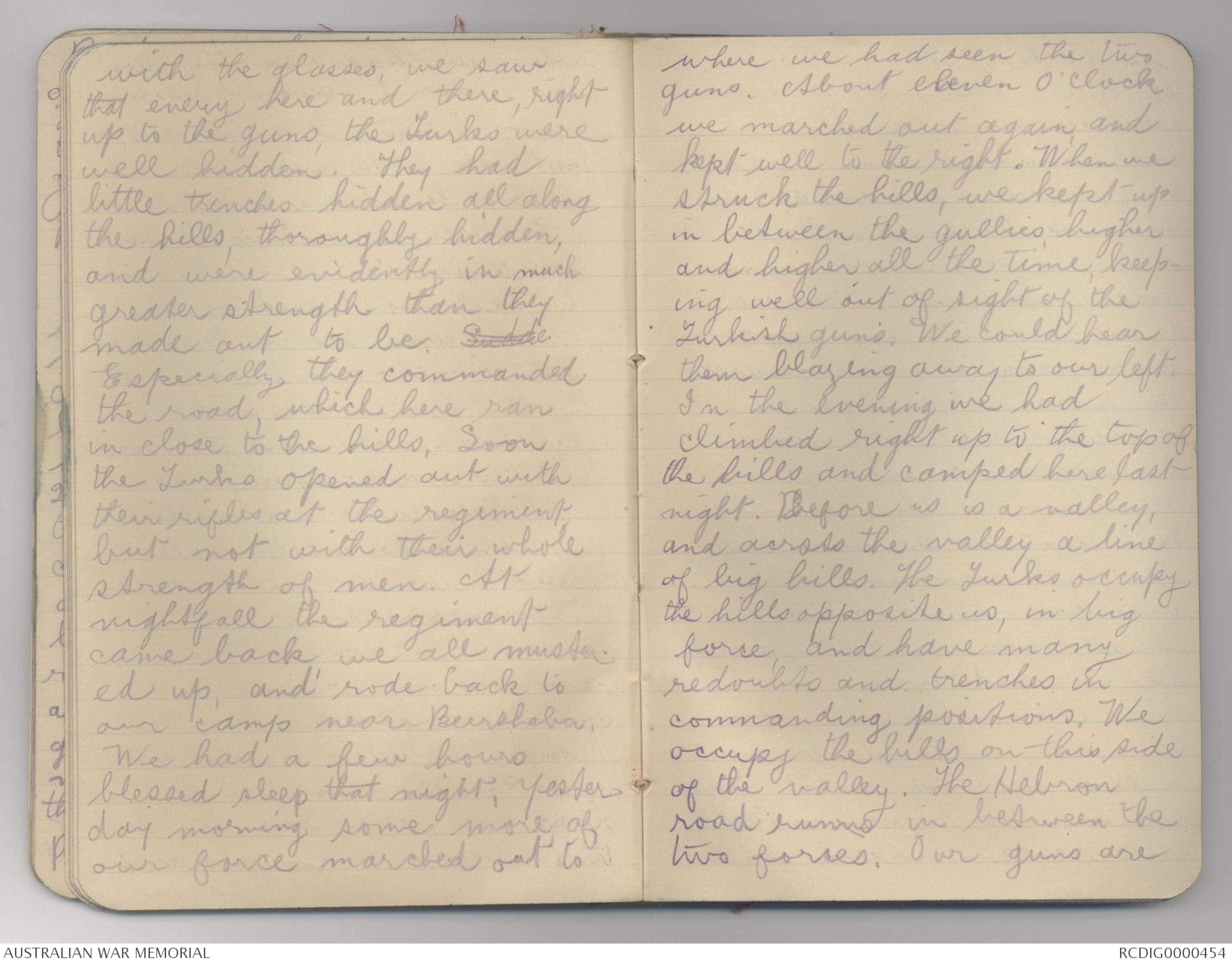
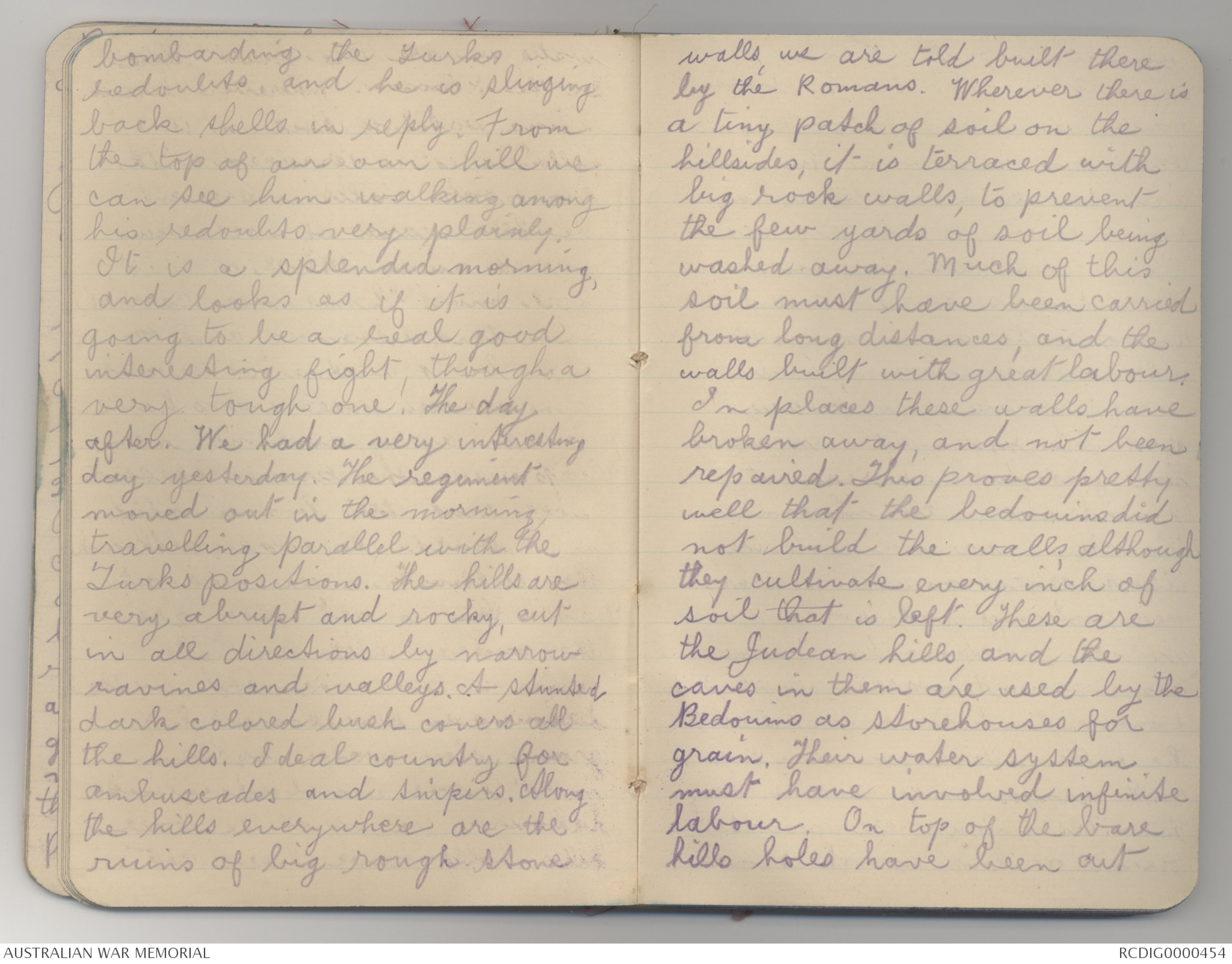
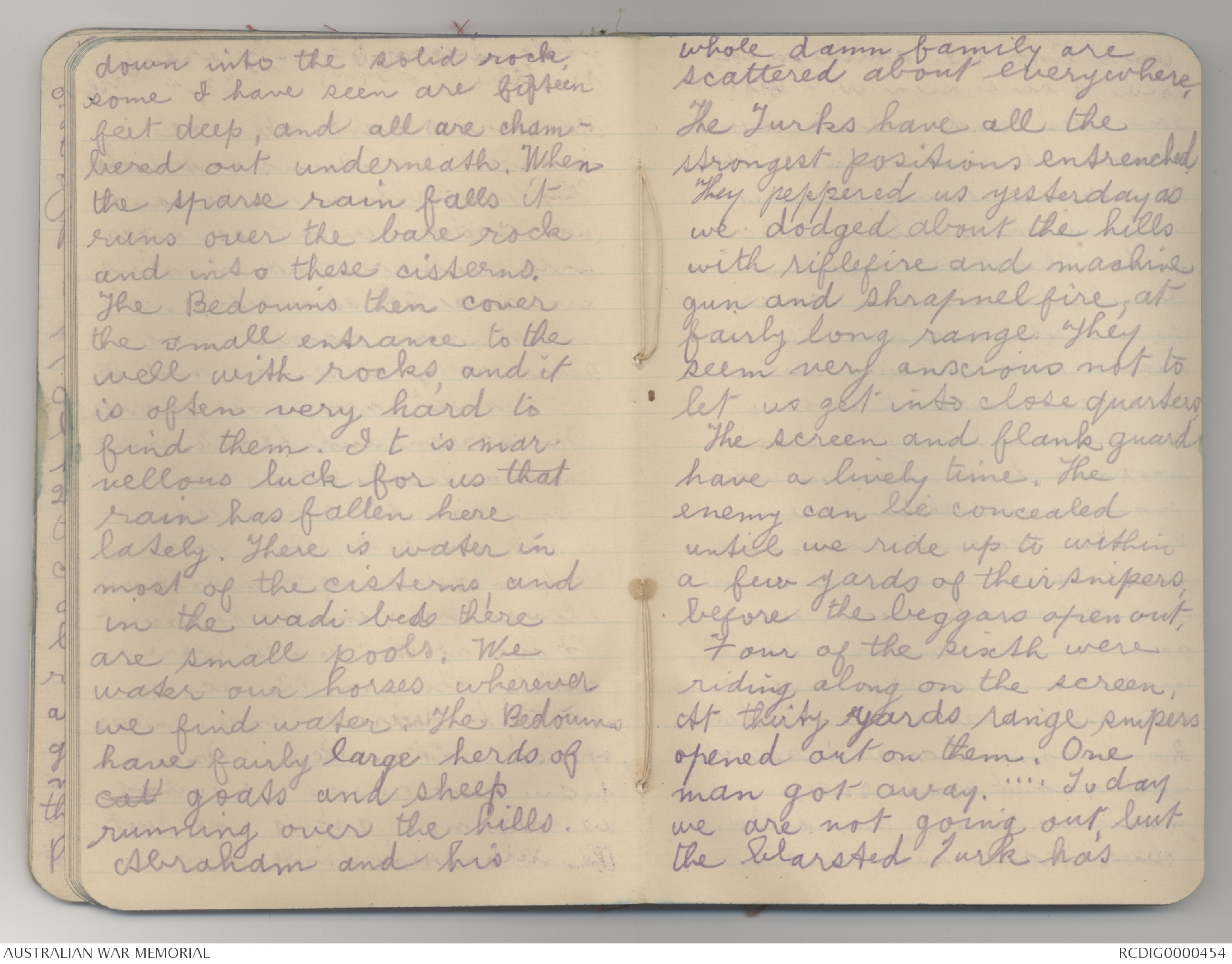
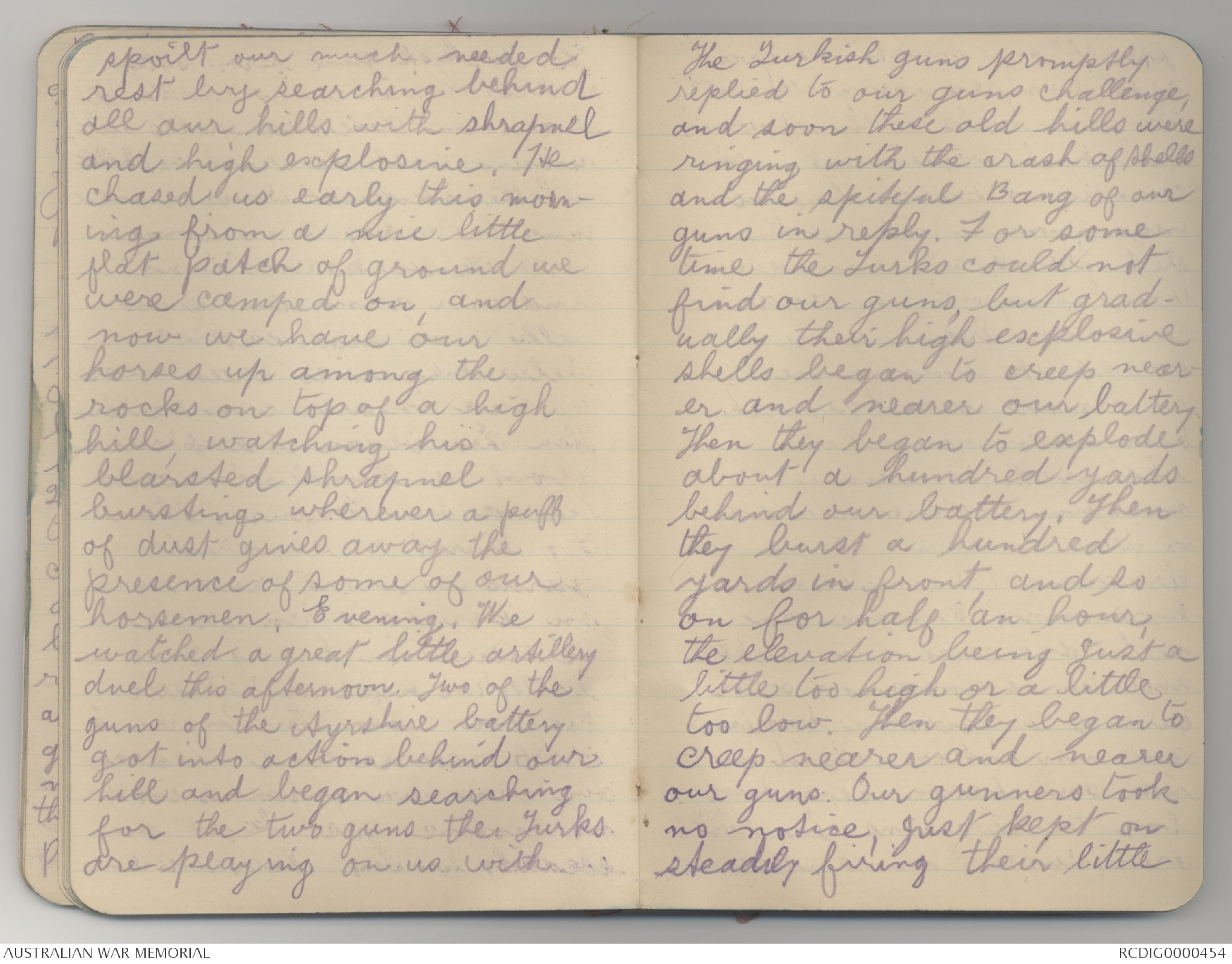
hemmed in by big limestone
hills. It has a snow white
little prayer house, mosque we
call it, and some half
dozen Turkish built barracks.
There is the commandants
house, with its neatly laid
out garden, in which nothing
grows. But the place exists
in its wells. Great circular
stone wells, from which
Moses and the Israelites
drew water in their earthern
jars. The Bedouins here today
draw water in the same
way, with a stone jar
attached to a rope, and
often the other end to a
little donkey. Some of the
top stones have cuts
worn in them eight inches
deep, from the ropes of
thousands of years of Bedouin girls drawing water from
the well. The Turk ran a
railway out to this place from
Beersheba, the same that we
blew up some months ago.
He put engines here, and
built a big reservoir and
great cement water troughs
for his horses and camels.
No doubt he was going to
use the water on his triumphant
march to Cairo. When
he cleared from here he
blew the big wells up. The
place is surrounded by the
white hills, and with the
sun shining down on the
snow white hills looks quite
picturesque 27th. We have
been doing some rough
patrol work. The country
here is rough rocky
hills, interspersed here
and there by passes. These
hills are inhabited by
Bedouins, hostile and
otherwise. Mostly hostile.
Thw work is going an all
the while here, but so far
Jackos cavalry have not
put in an appearance.
We can at times hear
the from around Gaza,
some forty miles away
now. At night we
can see the flashes, like
lightning jumping over the
hills in the far distance
28th We lost our old Colonel
to day. He has taken over
command of the 3rd Brigade
I think the Colonel was the
best liked officer in the whole
regiment, and the lot of us
are very sorry to see him
go. 29th. We are on duty
night and day here but as
this is the most critical
port of the operations we
don't mind. Things are very
interesting here. There is fighting
along the whole line, except
here. About 2nd Nov A few
nights ago we left the camp,
and rode away along the
really well metalled road
to Beersheba. It was full
moon, the road ran between
a valley of hills all the
way. Our artillery ambulance
and ammunition transport
rode along the road, and
the noise on the hard road
must have sounded a
long way off. Sometime
after twelve O Clock, the
road branched Up one
road went the Seventh
Regt, to tackle a Turkish
outpost at Bir Arard.
A New Zealand regiment
went up the other road,
to tackle another outpost
The rest of the Brigades
followed on behind, Both
roads junctioned again
near Beersheba, and
the whole force was to
join up at the junction.
The outpost the Seventh
were to tackle cleared
out, but just as daylight
was breaking we heard
rifle fire and machine
gun fire away to our
left, and knew that the
New Zealanders had
found their outpost at
home. Soon the old
sun was up, and damned
glad we were. Away went
that longing for sleep, and
we were allowed to smoke
up, which is paradise after
an all night cold ride. The
valley grew wider and
wider, Bedouin cultivation
made its appearance all
around, and finally, five
miles away in the hills we
caught sight of the white mosque
and houses of Beersheba. As
far as we troopers knew our
objective was to get behind
Beersheba and stop the
Turks from escaping, while
the other Brigades on our
left, with the infantry on
their left, made a frontal
attack on Beersheba itself.
Over the redoubts around
Beersheba were the schrapnel
clouds from our shells and
black clouds of smoke and
thick dust marked the
bursting of high explosive
shells. Machine gun and
rifle fire sounded much
closer. All our troops got
in artillery formation, as
we were crosssing a big
flat in full view of the
Turkish guns. We went
two miles before directly
from the hills in front of
us, came "Bang" then Whizz.-
zzz,zzzzz "Bang" and a
shrapnel shell burst over
the heads of the troop
just in front of us. It
was a steady hand
gallop then across the
flat, straight for the
hills in front of us. Jacko
shelled us all the way.
Some of the led horses got
excited, and the packs not
being strapped on properly,
they rolled under the
horses bellies, with the
result that the unfortunate
beggars who were leading
them had to dismount and
fix the packs again as
best they could. Presently
we got into a deep wadi, quiteclose to cover and waited a
while. The Seventh L.H. were
already in action. The regiment
was on the foot hills, firing
up the hills at the Turks. We
could see the Turkish machine
gun g bullets splattering
the dust up merrily all up
around the chaps in the
seventh. Then it came our
turn to give the Seventh a
hand. We had a gallop
across half a mile of flat
country to where the Seventh
had their horses in a deep
wadi. The Turks turned their
machine guns and rifles
on us, but their aim was
bad. We got into the Wadi
under cover, and dismounted
for action. But for some
reason or other we didnt
come into action. After
about an hour we mounted
again and took up a
position on the Turkish
flank, where we waited
until dark, alternately
watching the Turks in the
hills above us and watching
the Turkish shells bursting
amongst our men in the
flat behind. In the meanwhile
our little battery, with
a few shots, put a Turkish
gun out of action which
had been troubling us all
morning. When darkness
fell we rode about four
miles back to a big
wadi, watered our horses,
rode back towards the
Turks again, and went on
outpost duty for the rest
of the night, all terribly sleepy
and tired. Early next
morning out regiment was
up, and marching on to the
old Hebron road, rode
along it on Reconnaissance
duty. I believe it was the
original track old Abraham
came along from Hebron to
Beersheba. Anyway it is a
spendid metalled road
now. The road winds in
between high hills. After
about five miles we heard
the old old familiar "Bang"
the whine of the shell and
black du smoke and dusttold showed where a shell
had burst right by one of
our leading troops straight
ahead. That troop scattered
like startled sheep. There
was a quick canter for
cover for all of us then.
The Turks were on top of
a big hill, and seemingly
had two mountain guns
and a few men. Presently
their riflemen opened up, on
us, but no machine gun
fire. Some of our chaps
exchanged shots. We watched
them then for some hours
and they watched us, sending
in their shells when ever
they got a target. Presently
along came four of our
armored cars, spinning
merrily along the old
Hebron road. They got
in nice range of old Jacko
but he never said a word.
We were just in time tose gallop a man down to
warn them that there were
Turkish guns straight ahead.
But for that they would
have driven right into
the Turks arms. But when
those cards knew what was
waiting for them ahead,
they just turned tail, and in
ten seconds time ol only a
faint tr cloud of distant
dust marked where those armored
cars were. We calculate that
in twenty five seconds those
four cars were invisible. We
were lucky in striking pools
of water in a wadi bed, and
aftering watering our horses
we boiled our quarts and
got into bully beef and biscuits.
And damned good they are
when men are hungry. In
the afternoon our troop was
put on outpost near the
Turks while the regiment
rode a few miles further
over to the right to find
out if possible the strength
of the Turks. Now at first sight
those two guns and few Turks
looked an easy capture to a
regiment. But on looking closely
with the glasses, we saw
that every here and there, right
up to the guns, the Turks were
well hidden. They had
little trenches hidden all along
the hills, thoroughly hidden,
and were evidently in much
greater strength than they
made out to be. Sudde
Especially they commanded
the road, which here ran
in close to the hills. Soon
the Turks opened out with
their rifles at the regiment
but not with their whole
strength of men. At
nightfall the regiment
came back, we all mustered
up, and rode back to
our camp near Beersheba.
We had a few hours
blessed sleep that night, yesterday
morning some more of
our force marched out to
where we had seen the two
guns. About eleven o'clock
we marched out again, and
kept well to the right. When we
struck the hills, we kept up
in between the gullies, higher
and higher, all the time, keeping
well out of sight of the
Turkish guns. We could hear
them blazing away to our left.
In the evening we had
climbed right up to the top of
the hills and camped here last
night. Before us is a valley,
and across the valley a line
of big hills. The Turks occupy
the hills opposite us, in big
force, and have many
redoubts and trenches in
commanding positions. We
occupy the hills on this side
of the valley. The Hebron
road runns in between the
two forces. Our guns are
bombarding the Turks
redoubts, and he is slinging
back shells in reply. From
the top of our hill we
can see him walking among
his redoubts very plainly.
It is a spendid morning,
and looks as if it is
going to be a real good
interesting fight, though a
very tough one. The day
after. We had a very interesting
day yesterday. The regiment
moved out in the morning,
travelling parallel with the
Turks positions. The hills are
very abrupt and rocky, cut
in all directions by narrow
ravines and valleys. A stunted
dark colored bush covers all
the hills. Ideal country for
ambuscades and snipers. Along
the hills everywhere are the
ruins of big rough stone
walls, we are told built there
by the Romans. Wherever there is
a tiny patch of soil on the
hillsides, it is terraced with
big rock walls, to prevent
the few yards of soil being
washed away. Much of this
soil must have been carried
from long distances, and the
walls built with great labour.
In places these walls have
broken away, and not been
repaired. This proves pretty
well that the bedouins did
not build the walls, although
they cultivate every inch of
soil that is left. These are
the Judean hills, and the
caves in them are used by the
Bedouins as storehouses for
grain. Their water system
must have involved infinite
labour, On top of the bare
hills holes have been cut
down into the solid rock,
some I have seen are fifteen
feet deep, and all are chambered
out underneath. When
the sparse rain falls it
runs over the bare rock
and into these cisterns.
The Bedouins then cover
the small entrance to the
well with rocks, and it
is often very hard to
find them. It is marvellous
luck for us that
rain has fallen here
lately. There is water in
most of the cisterns, and
in the wadi beds there
are small pools. We
water our horses wherever
we find water. the Bedouins
have fairly large herds ofcatt goats and sheep
running over the hills.
Abraham and his
whole damn family are
scattered about everywhere,.
The Turks have all the
strongest positions, entrenched.
They peppered us yesterday as
we dodged about the hills
with riflefire and machine
gun and scrapnel fire, at
fairly long range. They
seem very anxious not to
let us get into close quarters.
The screen and flank guard
have a lively time. The
enemy can lie concealed
until we ride up to within
a few yards of their snipers,
before the beggars open out.
Four of the sixth were
riding along on the screen.
At thirty yards range snipers
opened out on them. One
man got away. .... To day
we are not going out, but
the blarsted Turk has
spoilt our much needed
rest by searching behind
all our hills with shrapnel
and high explosive. He
chased us early this morning
from a nice little
flat patch of ground we
were camped on, and
now we have our
horses up among the
rocks on top of a high
hill, watching his
blarsted shrapnel
bursting wherever a puff
of dust gives away the
presence of some of our
horsemen. Evening. We
watched a great little artillery
duel this afternoon. Two of the
guns of the Ayrshire battery
got into action behind our
hill and began searching
for the two guns the Turks
are playing on us with.
The Turkish guns promptly
replied to our guns challenge,
and soon these old hills were
ringing with the crash of shells
and the spiteful Bang of our
guns in reply. For some
time the Turks could not
find our guns, but gradually
their high explosive
shells began to creep nearer
and nearer our battery
Then they began to explode
about a hundred yards
behind our battery. Then
they burst a hundred
yards in front, and so
on for half an hour,
the elevation being just a
little too high or a little
too low. Then they began to
creep nearer and nearer
our guns. Our gunners took
no notice, Just kept on
steadily firing their little
 Sam scott
Sam scottThis transcription item is now locked to you for editing. To release the lock either Save your changes or Cancel.
This lock will be automatically released after 60 minutes of inactivity.